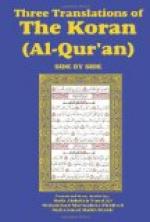Had thy Lord pleased he would have made mankind of one religion: but those only to whom thy Lord hath granted his mercy will cease to differ. And unto this hath He created them; for the word of thy Lord shall be fulfilled, “I will wholly fill hell with Djinn and men.”
And all that we have related to thee of the histories of these Apostles, is to confirm thy heart thereby. By these hath the truth reached thee, and a monition and warning to those who believe.
But say to those who believe not, “Act as ye may and can: we will act our part: and wait ye; we verily will wait.”
To God belong the secret things of the Heavens and of the Earth: all things return to him: worship him then and put thy trust in Him: thy Lord is not regardless of your doings.20
_______________________
1 See Sura lxviii. p. 32.
2 Or, will bestow his grace on every gracious one, or will bestow his abundance on every one who hath abundance (of merit). The difficulty of rendering this passage arises from the word fadhl, which means merit as applied to man, favour as applied to God.
3 That is, before the Creation. Precisely the same statement occurs in Raschi on Gen. i. 2, also in the modern catechism. Tsenah ur’enak b’noth Tsion, authoritatively put forth by the Polish and German Talmudist Rabbins. “At the first creation of Heaven and Earth . . . the throne of glory of the Blessed God stood in the air above the waters.” Comp. Ps. civ. 3.
4 Men, heaven, and earth. Comp. Tr. Aboth, v. Mischna 1.
5 Comp. verse 37 and Sura [xci.] ii. 21. It should be observed that the challenge in these passages is not to produce a book which shall equal the Koran in point of poetry or rhetoric, but in the importance of its subject-matter with reference to the Divine Unity, the future retribution, etc. Upon these topics Muhammad well knew that he had preoccupied the ground. And we may infer from the fragments of the Revelations of Musailima and Sajâh (Hisam. 946; Attabâri (ed. Kosegarten) i. 134, 136, 152; Tab. Agâni, 339), which are mere imitations of the Koran, that he felt this to be the case.
6 “They laughed and jeered at him in their words.” Midr. Tanchuma. “The passage Job xii. 5, refers to the righteous Noah who taught them and spake to them words severe as flames: but they scorned him, and said, ’Old man! for what purpose is this ark?"’ Sanhedr. 108. Comp. Midr. Rabbah on Gen. 30, and 33 on Eccl. ix. 14.
7 Or, oven: according to others, reservoir. Geiger thinks that the expression the oven boiled up may be a figurative mode of expressing the Rabbinic idea that “the generation of the Deluge were punished by hot water.” Rosch. Haschanah, 16, 2; Sanhedr. 108. Comp. Weil’s Legenden, p. 44.
8 The Montes Gordyoei, perhaps.
9 According to another reading: He hath done amiss. The origin of this story is probably Gen. ix. 20-25.




